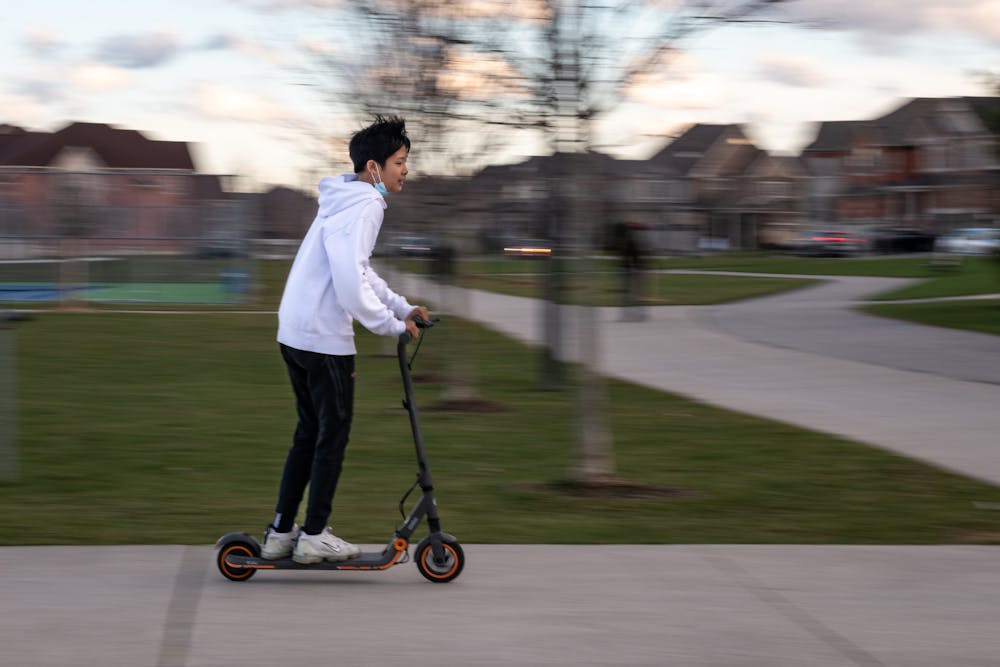Head to class on Locust Walk or any other sidewalk on Penn’s campus, and you can feel the wind from an electric scooter zooming past you. You may have noticed students carrying this two-wheeled vehicle up the stairs, placing them in lecture halls, or charging its electric motor in dorm spaces.
Due to their convenience, e-scooters are becoming increasingly popular across college campuses in the United States. For Penn students and athletes, it reduces the time it takes to get around campus. Given their increasing presence, Wellness at Penn and Penn’s Division of Public Safety should create new policies to better regulate the usage of these vehicles on campus.
E-scooters can travel up to 15 miles per hour. Consequently, there have been instances where e-scooter rides have gone wrong, resulting in visits to an emergency room. Injuries treated during these visits ranged from minor to severe with abrasions, lacerations, concussions, and intracranial hemorrhage. For a college student who is still undergoing development, experiencing any of those injuries is concerning because of the lifelong effects and impact on adulthood. The trauma associated with e-scooter accidents poses a serious public health concern and introduces the need for regulating e-scooter usage among college students.
There are very few studies investigating this issue, but a study published in JAMA Network Open exposes the scope of this issue among college students. They reviewed medical records at two urban emergency departments in Southern California. Of the 249 cases they reviewed, almost a quarter of e-scooter injuries applied to adolescents between the ages of 18 and 25, and of those injured, only 4.4% of riders reported wearing a helmet. Helmets save lives for bicycle riders, so helmets can help prevent injuries for e-scooter riders. Given these findings, Wellness at Penn and DPS should implement a helmet policy along with other e-scooter regulations.
It is also important that Penn administrators consider the current legality of riding e-scooters in the City of Philadelphia. The Pennsylvania state government, which influences policy-making in Philadelphia, has banned both public and private usage of e-scooters even among adult riders due to injury risk and traffic and congestion concerns.
When I shared this with a couple of Penn professors, classmates, and friends, they were shocked. It has become normal to see an e-scooter on campus, which are all privately owned. Students who purchase e-scooters online are also probably not aware of this policy because there is no enforcement of this law in the city. However, it does explain why public e-scooter rental-sharing companies, like Bird and Lime, are not doing business in Philadelphia. As a result of this policy, there have been few incidents of e-scooter related injuries reported in major Pennsylvania cities, demonstrating how policies help protect the wellbeing of communities.
So, if Philadelphia is not regularly enforcing this ban and addressing private usage of e-scooters, what should Penn administrators do?
First, Penn administrators should consider the age of its students and how the risk of riding e-scooters is increased for them.
Second, Penn administrators should enforce the current daytime ban, prohibiting the use of e-scooters on campus from 8:30 a.m. to 5:30 p.m. on Mondays through Fridays. Unfortunately, the current daytime ban, supplemented with educational approaches, is loosely recognized by students, so further awareness is needed.
Third, if Penn administrators decide to further regulate e-scooter usage on campus, they should consider their policy options. For example, in California, state policy allows adolescents over 16 years to rent an e-scooter if they have a driver’s permit, but they are required to wear a helmet while riding. Penn administrators may want to encourage helmet use among its students.
Meanwhile, administrators at Boston University, New York University, Columbia University, and some other universities decided to ban these vehicles. If Penn administrators do choose to implement a ban and enforce state law, they should consult class boards and gather student input on how to implement it, and hopefully this improves compliance with the regulation.
It will be interesting to see how Penn administrators address this issue on campus and prevent injuries from escalating on campus. Whatever changes Penn makes to its e-scooter policies, it should involve students' opinions to help with compliance with any current or future policy. In that way, Penn can maintain a safe campus environment and support the wellbeing of students.
CLAIRE BAPTISTE is a Master of Public Health graduate student in the Perelman School of Medicine from Northern Virginia. Her email address is cbapt1@sas.upenn.edu.









